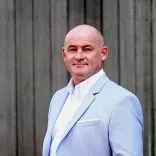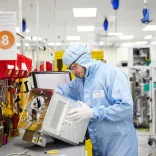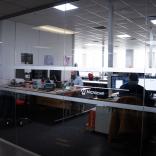Most electronic devices today are built on silicon semiconductors. They formed the backbone of a technological revolution, becoming the basis of computer and communications technology, moulding the bedrock of the multi-billion dollar global capital of tech innovation, Silicon Valley.
However, imminent future technologies require a basis with more powerful capabilities than silicon. For example, the evolution and deployment of 5G networks will require base technologies capable of managing extremely fast data transmission and power efficiency. 5G will be central to the development of future tech megatrends, and without the advancement of compound semiconductor technology its future is non-existent. Essentially it is impossible to overstate the influence that compound semiconductors will have on our future lives. Without them, our technologies could simply cease to evolve.
To break it down, compound semiconductors possess the essential qualities required to make 5G a reality. They are more powerful and efficient than silicon alternatives, and have the unique ability to detect and emit light. While they are not predicted to entirely replace silicon anytime soon, we will likely see widespread adoption of compound semiconductors across multiple application areas, driving huge growth in the global market.
According to the Compound Semiconductor Applications Catapult, an organisation headquartered in south Wales focused on helping UK companies exploit advances in CS tech, the UK currently has around a 9% share of the global CS market.** And moving forward, Wales is in a strong position to be at the centre of this international marketplace, with world leaders in the industry, such as IQE plc and SPTS Technologies, already having established a presence here.
In 2017, a £38m deal was signed to establish the world’s first compound semiconductor cluster in south Wales, bringing together organisations operating at every stage of the supply chain and creating huge opportunities for SMEs and larger companies in the region. Economy Secretary Ken Skates, at the signing on behalf of the Welsh Government which has invested a further £12m in the cluster, said: "We are punching well above our weight in developing technology which, not only plays an increasingly vital role in the way we live our lives today, but will drive innovation which will shape the world we live in tomorrow."
The cluster operates under the name CSconnected. Its partners operating in the research stage include Cardiff University and Swansea University, and the Institute for Compound Semiconductors. In compound semiconductor wafer design, production and fabrication, it includes IQE plc and Newport Wafer Fab. CSconnected also includes multinational specialist foundry equipment suppliers SPTS Technologies, which is headquartered in Newport, and chip level packaging solution providers Microsemi.
CSconnected aims to attract a further £375m in private investment and could create thousands of new careers in Wales.
Dr Drew Nelson OBE, chief executive of IQE said: "CSconnected represents the business, academic and government bodies actively engaged in the rapidly evolving compound semiconductor cluster across south Wales. The region is home to the world’s largest focus on the enabling technologies that will become increasingly ubiquitous in new and emerging technologies across multiple sectors from healthcare to big-data, from driverless cars to aerospace and from communications to safety and security systems.
"The cluster will position the region as a clear global technology leader that will contribute to higher wealth generation through strong collaboration across multiple sectors to build world-class, sustainable supply chains.
"Through demonstrating strengths in such a key global industry sector, the region will act as a magnet to attract new start-up businesses as well as inward investment to enjoy the benefits of being a part of the world's first compound semiconductor cluster."
Speaking to Trade and Invest, Stephen Doran, chief executive of the Compound Semiconductor Applications Catapult said: “What Wales has is unique. This cluster could create 3,000 to 4,000 highly skilled jobs in technology, with the CSA Catapult aiming to add another 1,000 in the UK through its direct intervention and collaboration with key industry partners. The CSA Catapult is currently recruiting highly skilled candidates to join its team in south Wales. Together, we will play a role in developing the CS market for existing companies in Wales, supporting the growth of new SMEs and attracting established industry players into the area.
“A cluster like CSconnected brings together a world leading academic base, R&D skills and the full end to end supply chain. Organisations coming to Wales to work collaboratively with the cluster would benefit from reduced development cycles, rapid time to production scale and access to the expertise necessary to turn innovative thinking into real products. For a company looking to exploit advanced compound semiconductor technology, having this cluster on its doorstep will be a real competitive advantage.”
Speaking of the cluster’s potential to bring further inward investment to Wales and open new markets to existing Welsh companies, Sam Evans, a director at Newport Wafer Fab said: “Newport Wafer Fab is a chip foundry that provides specialist manufacturing services. Like other cluster members, we are an open access organisation. The product design IP stays with our customers.
“Because of the complex nature of compound semiconductors and photonic process development, it’s a big advantage for a company to have its design HQ in close proximity to the manufacturing centre. And with the university R&D to production supply chain offered by the cluster, Wales is an attractive prospect for high tech companies looking to relocate.”
“More than 15% of our annual supplier spend is with companies based in Wales. The compound semiconductor cluster in the south east will create even more business opportunities for organisations across the region, particularly those within the specialist engineering services industry. We will see new links forged between the south east and other areas in Wales, such as the South Wales Valleys which possesses a wealth of engineering talent. The future is bright and it’s exciting to be a part of that.”
Organisations across the cluster are open and ready to work with SMEs and larger organisations across Wales to exploit advances in CS technologies across multiple industry sectors, with potential benefits for the automotive, aerospace, communications and healthcare industries and more. Take a look at the video below for a tour behind the scenes at the world’s first compound semiconductor cluster.
For more information on CSconnected visit: About us – CSconnected
__________________________
* Figures sourced from Allied Analytics, BCC Research, CSA Catapult estimates
** See interview with Stephen Doran, CEO of the CSA Catapult, with Trade and Invest Wales




